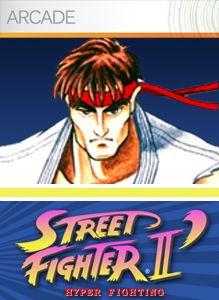Retro Replay Review
Gameplay
Street Fighter II’: Hyper Fighting takes the classic one-on-one fighting formula and cranks up the intensity. Matches feel faster and more responsive thanks to the increased game speed, making every clash of punches, kicks, and special moves snap off without delay. Longtime fans will notice the subtle rebalancing that smooths out previous character quirks—Zangief’s spd matchups are more reliable, Guile’s flash kicks retain their edge, and Ryu and Ken’s mid-air hurricane kicks open up fresh combo possibilities.
(HEY YOU!! We hope you enjoy! We try not to run ads. So basically, this is a very expensive hobby running this site. Please consider joining us for updates, forums, and more. Network w/ us to make some cash or friends while retro gaming, and you can win some free retro games for posting. Okay, carry on 👍)
With a roster of twelve fighters—eight from the original lineup plus the four boss characters from the arcade—Hyper Fighting delivers a diverse cast. Each character boasts unique normals, specials, and super-charged combos that reward practice. Learning to time Vega’s wall dives, Sagat’s tiger shots, or Mr. Bison’s scissor kicks remains just as gratifying in this XBLA port as it was in coin-op cabinets, especially when you nail those linkers and confirms in a tight tournament set.
The inclusion of the Quarter Match mode is a standout feature in the online suite. Designed to replicate that arcade crowd energy, it lets spectators bet their virtual quarters on winners and step into the ring themselves. Add in quick matches, custom-filter matchmaking, private lobbies, and traditional versus and training modes offline, and you have a robust package. Whether you’re drilling down on a fireball juggle in Training Mode or climbing the leaderboard in a heated online skirmish, the gameplay loop feels both complete and enduring.
Graphics
Sensory Sweep Studios has done an admirable job preserving the original arcade’s pixel art fidelity. Sprites are rendered crisply, with vibrant colors that pop on modern HDTVs. Each character’s palette remains faithful to their arcade wardrobe, and special move animations—such as Chun-Li’s Spinning Bird Kick or Dhalsim’s stretching limbs—feel fluid, thanks to a consistent 60 frames per second performance.
The background stages—from Ryu’s dojo to the brightly lit streets of Hong Kong—retain their characterful details and dynamic elements. Spectators in the Quarter Match mode line the edges of the screen, reacting to the action in subtle, believable ways. Environmental elements like banners, onlookers, and parallax scrolling all contribute to a lived-in backdrop that never feels static.
While some modern fighters boast high-definition 3D models, Hyper Fighting’s commitment to classic 2D remains part of its charm. Resolution scaling ensures sprites aren’t blurry or distorted, and clean user-interface overlays for health bars, timers, and round indicators sit unobtrusively at screen edges. On the whole, this is arcade art at its best—unaltered in style but polished for today’s screens.
Story
Unlike narrative-driven fighters, Street Fighter II’: Hyper Fighting leans into minimal storytelling, offering brief character intros and victory quotes rather than a sprawling single-player campaign. Each fighter’s motivations—whether it’s Ryu’s quest for personal improvement or Guile’s drive for vengeance—are hinted at in classic arcade fashion. While there’s no cinematic story mode, the intrigue comes from mastering rivalries and writing your own highlight-reel moments.
The arcade ladder presents a straightforward gauntlet: defeat the eight base fighters, then overcome the four bosses—Balrog, Vega, Sagat, and M. Bison—to claim supremacy. This structure gives each match purpose, and delivering the final blow on a towering boss still carries that rush of satisfaction. Short win quotes and character animations inject personality, keeping you invested even as you replay the mode to refine your skills.
For players seeking deeper lore, the manual and in-game profiles outline each character’s backstory, fighting style, and homeland. These concise vignettes provide context without slowing down the action. In a sense, the story unfolds through each round, as you learn how to counter a spinning piledriver or exploit an opponent’s recovery frames. It’s an emergent narrative driven by skill and competition.
Overall Experience
Street Fighter II’: Hyper Fighting on Xbox Live Arcade strikes a fine balance between faithful arcade emulation and modern convenience. Offline modes like Arcade, versus, and training give newcomers ample space to learn movesets, while the online infrastructure—complete with matchmaking filters, voice chat, and leaderboards—caters to competitive veterans. The natural flow from quick match to custom lobby, or to the Quarter Match gauntlet, makes multiplayer addictive and accessible.
Achievements and integrated statistics encourage you to track milestones—land 500 fireballs, rack up 100 throw victories, or maintain a lengthy win streak. These goals push players to explore the full depth of each character, keeping the experience fresh long after the initial nostalgia-driven runs. Voice chat adds a social pulse, letting you trash-talk or share tips between rounds.
All told, Street Fighter II’: Hyper Fighting remains a cornerstone of the fighting-game genre. Its brisk pacing, balanced roster, and array of modes deliver lasting appeal. Whether you’re a veteran looking for pixel-perfect arcade action or a newcomer intrigued by the roots of competitive fighting games, this XBLA port stands as an essential pick for your digital library.
 Retro Replay Retro Replay gaming reviews, news, emulation, geek stuff and more!
Retro Replay Retro Replay gaming reviews, news, emulation, geek stuff and more!




Reviews
There are no reviews yet.